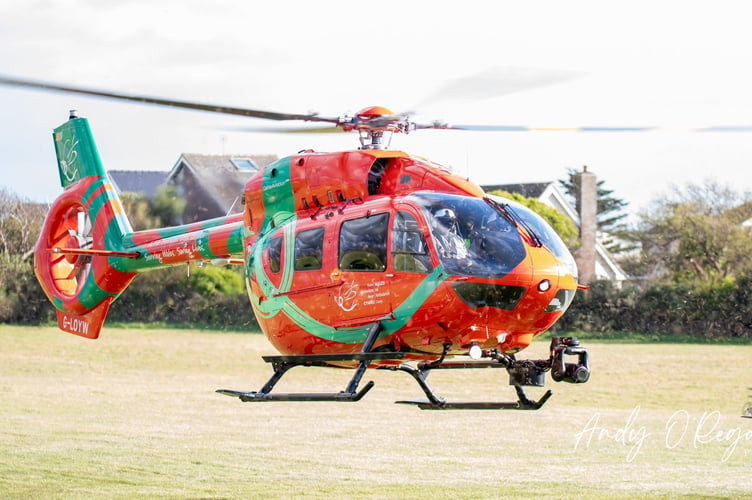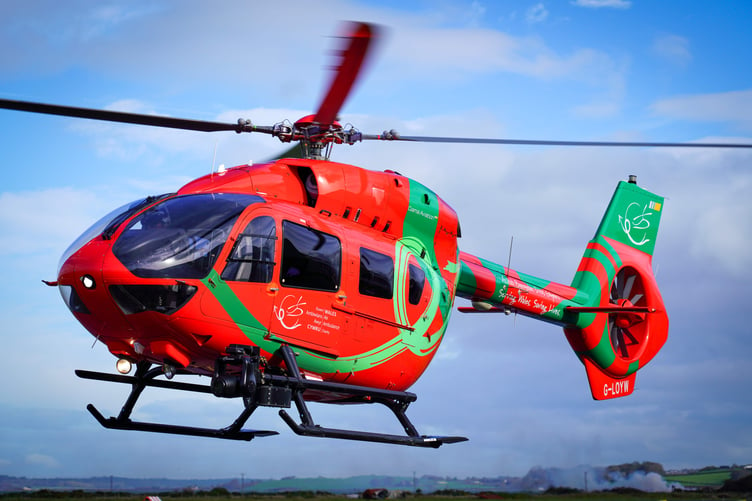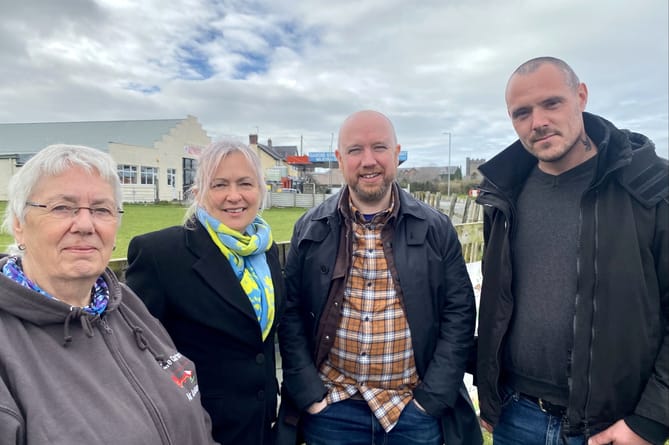Campaigners will continue fighting for Caernarfon and Welshpool air ambulance bases, despite last week’s devastating decision to axe them by 2026.
On 23 April the NHS Wales Joint Commissioning Committee (JCC) made a majority decision to follow the recommendation of the Emergency Medical Retrieval and Transfer Service (EMRTS) to close both bases. The committee is made up of four lay members and seven Welsh health board chief executives. Of the seven health boards, only Powys and Betsi Cadwaladr refused to support the recommendations.
Campaigners say lives will be lost and the fight to overturn the decision has begun. A petition set up by Karl Ciz asks for a full public enquiry into the review to be conducted by Welsh Government. However if the decision stands, a rival service begin, as Tywyn campaigner Andy O’Regan explained.
“A full judicial review is a probable next step. This will be lengthy and costly, but will look into every aspect of this process from its very inception, leaving no stone unturned!
“I have made enquiries into setting up a rival service. This is very early in its inception but could be wholly viable for us moving forward to fill the inevitable deficit in coverage this move will create.
“It looks like we are going to have to look after ourselves.
“The very reason we have an air ambulance is our rurality, to quote Stephen Harrhy [Chief Ambulance Services Commissioner] ‘Heli’s for Rural, RRV’s for Urban’, and this is the ethos we will continue to hold moving forward.”
An RRV is a rapid response vehicle, and they could replace the helicopters. Campaigners say this is disastrous given the rurality of the area and the type of roads they would travel on.
Andy added: “I’m bamboozled by the decision to close the bases.
“A judicial review will give us some time. At the moment we have until 2026 but I wouldn’t be surprised if they pushed that forward.
“Also, where is the money coming from for the new base?
“We don’t have answers to any of the questions we’ve asked, we’ve just been told we’re wrong to want to keep the bases open, but I feel passionate about this. We won’t be giving up.”

Dwyfor Meirionnydd MP Liz Saville Roberts, MS Mabon ap Gwynfor, Hywel Williams MP, Sian Gwenllian MS, Rhun ap Iorwerth MS said the decision to close Caernarfon and Welshpool in favour of centralising the service in northeast Wales “goes against the interests of communities across northwest and mid Wales”, adding: “We have far from been assured that the areas most at risk from these plans such as Pen Llŷn, south Meirionnydd, Ynys Môn, and mid Wales won’t be left with a slow-track and substandard service.
“'Considering some of the questions about the data being used as a basis for the proposal, it is not unreasonable for people to have serious concerns we will have a significantly inferior service.
“Neither have we been provided with sufficient information on what the implementation of these recommendations would look like and the steps that would be taken, for example, to develop the road-based service referred to in recommendation 4.
“Llais made it clear more time and information was needed to reach an informed decision, so the committee’s decision to shoehorn the proposals through without affording health boards adequate time to consider the impact of the recommendations is both worrying and disappointing.
“We have not been provided with compelling evidence to convince us that closing both bases won’t lead to a significantly poorer service.
“It's regrettable that the views of frontline EMRTS clinicians, campaigners, and overwhelming opposition from the wider public have been summarily disregarded. It should be appreciated that the Wales Air Ambulance charity is nothing without public support.
“This is not the end of the fight. We will continue to work with local campaigners to explore all possible options to challenge this short-sighted and centrally driven decision.

“People living in northwest and mid Wales should not have to suffer measurably worse outcomes based on flawed data which has not been independently verified.”
Llio Elenid Owen, Gwynedd councillor for Groeslon which includes Dinas Dinlle Air Ambulance base, said the closure “is bitterly disappointing and heart wrenching”.
“The whole community has worked tirelessly to convey the importance of this crucial service in my ward which serves the whole of Gwynedd.
“We will lose a valuable resource, jobs and expertise from the area. Today is a tragic day for this community, for the surrounding area and for Gwynedd.”
But Wales Air Ambulance welcomed the decision, saying improvements to the service will save even more lives across Wales.
They say the independent review identified that, on average, two-three people every day need the service, but do not receive it (known as unmet need).
North Wales and the northern parts of mid Wales are disadvantaged at night as the service currently only has one overnight crew, based in Cardiff, covering the whole of Wales, and their medical teams in Welshpool and Caernarfon are underused.
The review sought to resolve these issues by examining the most effective and efficient way of delivering the service and looked at over 200 options.
A charity spokesperson said: “The final recommended option was approved by the Joint Commissioning Committee.
“This major service improvement will see the current crews and existing assets in Caernarfon and Welshpool come together in a new base located in the middle of north Wales, near the A55.
“Reflecting demand in the regions, one crew will operate 8am until 8pm. A second crew will operate between 2pm and 2am. Alongside the current highly utilised resources in Dafen and Cardiff, clear evidence shows this development would see improvements for all parts of Wales.”
Speaking on behalf of the charity’s trustees, Chief Executive Dr Sue Barnes said: “This review was important as lives are currently under threat. It is vital to address the issues of unmet need, inequity and service underuse.
“The inequity is clear to see when we look at the number of incidents our service was unable to attend in Powys and north Wales, between 8pm and 2pm, during this 18-month review process. 310 incidents. That is not a hypothetical figure and these are not hypothetical cases. These are real patients with very serious and life-threatening conditions.
“Sadly, some of these patients will have died.
“Why were we unable to attend? Because, at present, our service is not being delivered in the most effective way.
“Throughout this process, we consistently said that we aim to ensure any independent recommendation put forward can enable us to guarantee that charitable donations are used in the most effective, patient-focused way. This means saving as many lives across Wales as possible, and in doing so, making sure that no community is materially disadvantaged as a result of any changes.
“We want to thank the communities in the northern parts of mid Wales and north west Wales for the incredible passion they have shown for the charity.
“I want to reassure you that you are not losing a service. There is no credible evidence whatsoever to suggest patient outcomes in your areas will be negatively impacted as a result of this development.
“Also, rumours are circulating that we will be removing an aircraft from our primary fleet. That’s not the case. The service will continue to be delivered with four helicopters and a fleet of rapid response vehicles.
“This is an improvement for all parts of Wales, particularly mid and north Wales who will be gaining a more local overnight service – something they don’t have at present. To put that into context, that is 750,000 people who have to rely on an available response from Cardiff after the hours of 8pm. This solution allows us to remedy that at no extra cost to the people of Wales.
“However, we strongly empathise with the genuine concerns and anxieties that have been expressed about wider NHS Primary and Secondary care provision in these regions. As a very small and very specialist service, we are a small cog in the wider machinery of pre-hospital emergency care.
“There is very little we can do to address many of those concerns and nor should we be responsible for covering gaps in NHS provision.
“We have raised this with the Chief Ambulance Services Commissioner and he has reassured us that these issues have been passed on to the appropriate NHS representatives for their information and action.”
Dr Barnes continued: “We have respected the independence of the process, having no direct involvement in the review and avoiding commentary on it. This has been difficult for us. In the course of 18 months, it has been impossible not to notice and reflect on some misunderstandings about our service and the way that it is delivered. It’s important that we address this as it will help the understanding of how the service will be improved by this development.
“We now invite our supporters, partners, community representatives, and political representatives to work with us in maintaining a sustainable charity for the here-and-now, and for our future generations.
“The review process must be evaluated to identify any improvements for future reviews. Making improvements to a gold-standard service should not be this cumbersome. Equally, it’s vital that we continuously evaluate this service development to make sure that it is delivering the benefits we believe it can.
“We are committed to being involved in these evaluations.” For over 23 years, the public has put their trust in the charity. That trust has allowed the charity to create one of the largest air ambulance services in the UK and one of the most medically advanced in Europe.
The charity, which has attended over 49,000 missions since 2001, needs to raise £11.2 million every year to operate and maintain its four helicopters and fleet of rapid response vehicles.
Dr Barnes said: “We appeal to our supporters to trust us once more as we work with our medical partners to further improve our lifesaving service for the benefit of everybody in Wales.
“Our commitment is, and always will be, to deliver the best possible care, with the resources available to us – wherever and whenever it is needed.
“We exist because of you and with your support, our charity will be there for you and your community – now and always.”
In conclusion, Dr Barnes said: “This is the start of a journey to reduce unmet need across Wales. There is more than we can do and we will work with all partners and stakeholders to ensure that we can save as many lives as possible.
“We will start work immediately on the planning for a new facility. We will do this with the involvement of our service’s medical and aviation colleagues to create a site that meets their needs.
“We believe that a new base operation will be achievable within the next few years.”
But Gwynedd councillor for Harlech, Gwynfor Owen, said: “The announcement that Caernarfon and Welshpool Air Ambulance services are to close is bitterly disappointing. For people living in Meirionnydd and Pen Llŷn, this is a drastic blow to services.
“Already, reaching these sparsely populated and rural areas during an emergency medical situation is challenging. With health boards and road ambulance services already struggling, how on earth is moving these bases to a central location in north Wales going to service our areas better? I am at a complete loss!”
Delyth Lloyd Griffiths, Brithdir, Llanfachreth, Y Ganllwyd and Llanelltyd ward representative said: “The local communities of south Gwynedd and mid Wales will be astounded at this news.
“Rural areas, many include rugged hillsides, farmland and rocky terrain have long been serviced by the incredible health experts on board these helicopters based at Caernarfon and Welshpool.
“How on earth is closing these bases and relocating to one central north Wales location going to work?
“With an already challenging role, this is a step too far and puts people's lives at risk.
“For the benefit of our residents in Gwynedd and Powys, we must continue to work as one and challenge this decision.”
Russell George MS, Shadow Minister for Mid Wales, said: “This decision is a huge blow for the people of mid and north Wales.
“Closing these bases will have a direct impact on patients’ access to urgent medical treatment across the areas.
“The Welsh Government must now intervene and prevent the bases from closing.”

.png?width=209&height=140&crop=209:145,smart&quality=75)



Comments
This article has no comments yet. Be the first to leave a comment.